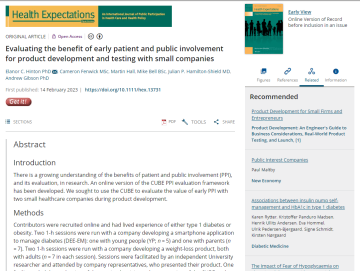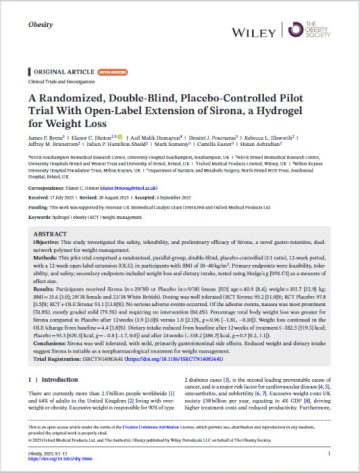Is hydrogel safe and effective for weight loss?
Theme Diet and physical activity
Workstream Clinical diet and physical activity
Status: This project is ongoing
Surgery is the most effective but also the most expensive way for maintaining long-term weight-loss in patients living with obesity. Nearly four million people in England are eligible for weight-loss surgery but in 2019 the NHS carried out only 4,509 of these procedures. People living with obesity can now also take medication to help them manage their weight. However, medication is less effective than surgery and can be associated with more side effects.
Oxford Medical Products (OMP) is a UK-based biotechnology start-up developing a product to provide a safe, effective and affordable alternative treatment for weight loss. OMP’s product comes in the form of a hydrogel pill that expands in a patient’s stomach after they swallow it. After expanding, the hydrogel takes up space in the stomach which could reduce how hungry a patient feels and how much they want to eat. This could potentially lead to changes in eating behaviour and subsequent weight loss.
Hydrogels are substances with a soft consistency that can absorb large amounts of water. They are already used in the production of contact lenses, disposable nappies and wound dressings, among other things. We are working with OMP on a first-in-human study of their hydrogel-based weight loss product.
Project aims
The overall aim is to determine the safety, feasibility and tolerability of a hydrogel-based product that supports weight loss without the need for surgery or medication.
We are working with OMP and their partners University Hospitals Southampton NHS Foundation Trust and the NIHR Southampton Biomedical Research Centre to:
- monitor serious adverse events
- assess blood and stool samples
- measure how many participants are recruited and how well they follow trial requirements
- use questionnaires to find out what participants think of the product
- trial an innovative, app-based assessment of appetite and satiety developed by a team in the University of Bristol’s Nutrition Behaviour Unit in the School of Psychological Science
Patient and public involvement
We facilitated two sessions during which OMP representatives were able to present their product to public contributors with lived experience of obesity. Contributors were then given the chance to share their opinions about the product and suggest potential changes for the company to consider. We published our findings from these sessions in the Health Expectations journal.
Some of the work on this project will be carried out by Becca Elsworth and will be included in her PhD thesis on ecological momentary assessments (EMA) and appetite measures.
Our work so far
We performed a clinical trial to assess the effectiveness of OMP’s hydrogel-based weight loss pill, called Sirona. The trial was a collaboration between OMP, NIHR Southampton Clinical Research Facility, NIHR Southampton BRC, NIHR Bristol BRC, North Bristol NHS Trust and Milton Keynes NHS Trust.
39 participants took part in the trial, which lasted 6 months.
In the trial, participants lost up to 13.5% of their body weight in just six months. On average, people with class 1 obesity (BMI 30-35) lost 6.4% of their body weight.
Participants also ate on average 400 fewer calories per day compared to those taking a placebo.
The pill was well tolerated and there were no serious adverse events.
What next?
OMP is planning a study in the UK and USA to further assess the effectiveness of Sirona and confirm these results. The company is aiming to launch Sirona as a commercial product in 2027.

Evaluating the benefit of early patient and public involvement for product development and testing with small companies
